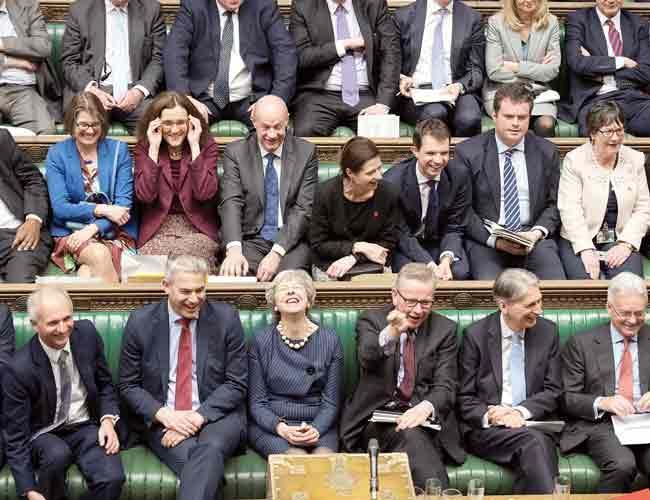
The U.K. parliament’s vote to ask the European Union to delay Brexit until at least June and head off a chaotic end to their 46-year partnership in two weeks, has given both parties and markets a sigh of relief.
But lawmakers also rejected a call to use that time to hold a second Brexit referendum - a blow to the hopes of a large swath of Britons who still dream of keeping their European identities.
The UK is barreling towards the March 29 Brexit deadline with no approved EU withdrawal agreement and a prime minister who appears to have lost control over her bickering cabinet.
Anxious businesses are pleading for action and U.S. President Donald Trump waded in to pronounce himself “surprised to see how badly it has all gone.”
A sense of chaos filled the House of Commons this week as lawmakers held a series of votes on ideas about what they could do next.
MPs have twice rejected the deal struck by Prime Minister Theresa May’s with the other 27 EU nations - in January and on March 12.
They voted on March 13 not to leave without an agreement but still lacked a clear roadmap on the way forward three years after Brexit was launched in a bitterly divisive referendum.
The plan they all finally agreed on - after turning down four other proposals - was submitted by May herself: to ask EU leaders to simply push Brexit back.
The motion also supported holding a third vote early next week on May’s twice-rejected deal.
A revised tally showed it passing by a 413-202 margin despite the majority of her own party - and seven of her 28 cabinet members - voting against.
May had already lost her voice earlier in the week and did not stand up to speak before the chamber after all the voting had wound down for the day.
“Parliament’s rejection of no deal and desire for an extension shows there is still some common sense in Westminster,” the influential CBI business lobby tweeted after the vote.
“But without a radically new approach, business fears this is simply a stay of execution.”
A bumpy “no deal” exit on March 29 will still happen if May’s strategy is voted down for a third time and the EU 27 fail to approve an extension.
EU leaders have said they would consider any request from London.
But they also want to know how long the extension would be - and what it would be used for - before they meet in Brussels in a week’s time.
May’s plan is to hold a third vote on her agreement with Brussels by March 20. The deal is aimed at ensuring a smooth exit from the European Union, to be followed by a transition period that could last until 2022.
Approval would then see her ask for the delay until June 30 so that the treaty can be ratified.
But she warns that her deal’s rejection next week could see Brexit postponed for much longer.
A bigger delay would also see Britain take part in European Parliament elections in May - bizarrely re-immersing the country in EU politics after Brexit was originally meant to have gone into effect.
EU Council chief Donald Tusk said on March 14 that the bloc could approve a long postponement “if the UK finds it necessary to rethink its Brexit strategy and build consensus around it.”
Britain wants an orderly exit from the European Union but the legal default is still to leave on March 29 unless an alternative solution is put in place, May’s de-facto deputy said on March 15.
“I hope still we can leave as soon as possible in an orderly fashion but that depends upon parliamentary approval both in principle of a withdrawal agreement but also then the implementing legislation that has to follow before lawfully we can ratify that treaty,” David Lidington told BBC radio.
European shares rose on March 15 breaching a five-month high hit a day earlier as investors cheered positive signals over U.S.-China trade talks and after U.K. lawmakers voted to delay the potentially chaotic EU.
All the major bourses were in positive territory, although London’s FTSE 100 outperformed the pack, lifted by its heavyweight oil and mining stocks on higher metals and crude prices. Trade-sensitive DAX was up 0.1 percent.